The Hindu
SUHASINI HAIDAR
In October 2006, India supported Shashi Tharoor’s bid to become United Nations Secretary General. The battle for the post was closely fought, but what hurt India the most was not losing but the fact that its candidate, who is now a Congress MP, was pitted against two other South Asian leaders — Ashraf Ghani, now the President of Afghanistan, and Jayantha Dhanapala, Sri Lankan UN diplomat — neither of whom bowed out in India’s favour. Worse, the Sri Lankan candidate actually endorsed South Korea’s Ban Ki-moon, underlining India’s regional isolation on the issue. Ten years later, the prize is much bigger as India hopes to push for a place in the UN Security Council, in the UN’s 70th year. The government has also made considerable efforts to build international consensus around the Comprehensive Convention on International Terrorism, which it would like to see progress this year.
As last week’s mega international conference in Delhi, the Raisina Dialogue, showed, the lesson in 2016 remains the same as the one from 2006: it is not possible for India to be a world leader or an Asian leader without first being a South Asian leader. What’s more, it is important for India to work on uniting, connecting, and sharing its prosperity with its neighbours before seeking the same from outside. “If you cannot integrate with your region, you cannot integrate with other regions,” said former Foreign Secretary Shyam Saran in a keynote session at the conference.
Participants from the region were more specific. The delegate from Nepal said that border connectivity, despite India’s promises, remains poor. What’s more, border infrastructure for India’s more peaceable neighbours to the north and east — Nepal, Bhutan, Bangladesh and Myanmar — is much less developed than for countries to its west. Adding to that, no Indian centre of excellence or modern city has been developed close to India’s northern borders or can be accessed easily by its neighbours, and India’s poorest, least developed States border these four countries. As a result, SAARC road and rail connectivity requires immediate attention, and the still-not-developed Bangladesh-Bhutan-India-Nepal corridor compares unfavourably to the 38,400-km ASEAN Highway Network or the Singapore-Kunming Rail Link, while China’s first-ever cargo train to Tehran heralds the way for a China-Afghanistan-Iran rail and road link as well.
Desiring cooperation, not competition
The second message was that India’s neighbourhood desires cooperation rather than competition between India and China. Calling for a coordinated approach between India’s Connect Central Asia policy and China’s One Belt, One Road Initiative (OBOR), former Afghanistan President Hamid Karzai said the two countries need “positive symmetry”. Why can’t India see that its neighbours look to China for its economic power and not see it as a threat, asked former Sri Lankan President Chandrika Kumaratunga. These are powerful words that India can ill afford to ignore. While it is possible for the subcontinent’s largest country with the greatest security interests to cavil at U.S. F-16 aircraft sales to Pakistan, Pakistan’s JF-17 aircraft sales to Sri Lanka, or Chinese submarines docking in Colombo or Male port, it is much harder to stop development projects without evoking a negative response in the region. Leadership comes at a price, and until India becomes a net provider of prosperity in the region, it will be harshly judged for blocking aid pipelines. It was unfortunate that the government didn’t use the conference’s theme of ‘Asian connectivity’ to clarify what India’s position on OBOR is, and how it correlates to India’s plans. Worse, the ministers and Foreign Secretary did not even refer to the project directly.
More worrying is that India aspires for this leadership without an internal assessment of what it costs to project its power on the international sphere. Earlier this month, The Hindu reported on a Finance Ministry memo that seeks to curtail rather than increase visits by Ministry of External Affairs diplomats abroad. The move, along with a diktat to secretaries not to travel above four times a year without prior permission from the Prime Minister, seems absurd, if not completely out of sync, with India’s ambitions. Likewise, this year’s Budget proposal, that shows a significant drop in developmental assistance to six SAARC countries, casts doubts on the seriousness of the government’s ‘Neighbourhood first’ programme.
Finally, an unspoken but resounding message from the Raisina Dialogue was that India needs to maintain the U.S.-China balance despite its obviously friendlier relationship with Washington than with Beijing over the last few years. As U.S. President George Washington wrote more than two centuries ago: “The Nation, which indulges towards another habitual hatred, or an habitual fondness, is in some degree a slave. It is a slave to its animosity or to its affection, either of which is sufficient to lead it astray from its duty and its interest.” (“Farewell Address”, September 17, 1796). These words ring true for India in this context. It is important then that Defence Minister Manohar Parrikar himself shot down the proposal made by U.S. Pacific Command chief Admiral Harry B. Harris during the conference, when the U.S. commander called for joint Indo-U.S. patrols to secure freedom of movement in the South China Sea. India’s valid concerns about China’s increased aggression towards China’s maritime neighbours must be balanced with India’s desire to resolve land-border issues as well as cooperate on developing the entire region along with China, which despite all the issues has been India’s largest trading partner since 2008.
This is a balance that India will increasingly have to engage with in its neighbourhood as well, as both the U.S. and China make increased overtures to countries of the subcontinent. Future versions of the Raisina Dialogue would do well to look for greater participation from both countries, even as India uses the event to project its power well beyond South Asia.




